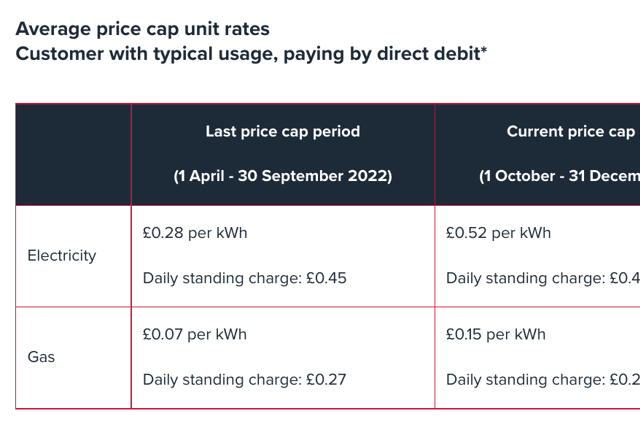Energy price cap: Soaring bills a massive concern for Liverpool families - tips to cope with price rise
and live on Freeview channel 276
The Office of Gas and Electricity Markets (Ofgem) have announced that the average energy bill for households across the country will rise to £3,549 per year.
The cap currently stands at £1,971 but from October this will increase by a whopping 80%, with another increase expected at in January and April next year.
What is the price cap?
Advertisement
Hide AdAdvertisement
Hide AdThe energy price cap is the maximum amount an energy supplier can charge households. The drastic increases is due to the increased wholesale cost of energy, which have risen exponentially due to the Russia/Ukraine war and covid-19.
The cap limits the amount that suppliers can charge for each unit of energy and ensures that suppliers can’t make large amounts of profit at the expense of customers.
What is the increase per unit?
The cost of electricity will rise on average from 28p per kWh to 52p in October and gas will increase from 7p to 15p per kWh. The cap will then be reviewed again in January and April next year.


Anyone on a fixed tariff will not see their bills rise instantly, but when the contract ends, they will be switched to a variable rate, set at the price cap.
The impact on Liverpool households and businesses
Advertisement
Hide AdAdvertisement
Hide AdThis year, Liverpool has lost several independent businesses as a result of the cost of living crisis. Veggie Republic, a vegan eatery in Liverpool city centre, closed their doors last month - stating that they simply could not afford to continue their business due to COVID-19 and the cost of bills.
Higher energy bills mean customers have less disposable income, whilst business owners see their bills sky rocket and need to increase prices to survive. The concern is that the city will lose more businesses as a result of the energy increase.
For low income families, especially during the Autumn and Winter months, the price of energy will cause extreme stress and worry, even with the government providing all households with a £400 energy rebate payment in October.
Liverpool Community Advice are aware of the drastic impact the increase will have on local residents.
Advertisement
Hide AdAdvertisement
Hide AdSpeaking to LiverpoolWorld, Helen Fisher, Energy Champion for Liverpool Community Advice said: “LCA has for many years worked with the Big Energy Saving Network, helping people save money on their bills, change suppliers and/or tariffs, but this year we are not able to do any of this for our clients because of the unprecedented situation within our energy industry.
“This year we are only able to give energy efficiency advice for saving on gas and electricity in the home. We can also give information on the various schemes the government is proposing to help people tackle the huge rise in their bills.
“Sadly these actions will not be enough. Retired, disabled people or young families will not be able to afford to pay their bills for energy or food because they physically do not have enough money coming into their households to cover their essential expenditure.”
How can I cope with the cost of energy?
Liverpool Council’s Happy Homes team are able to provide support for coping with high bills, and tips on how to reduce energy usage. Visit www.liverpool.gov.uk/housing/fuel-poverty-and-energy-efficiency/ or call them on freephone 0800 0121 754.
Advertisement
Hide AdAdvertisement
Hide AdLiverpool Community Advice have provided the following tips for coping with the energy increase:
1. Read your meters, even if you have a smart meter. Your bills need to be based on your actual readings.
2. Do not cancel Direct Debits without arranging to pay using another method. As well as losing the £60 discount for paying by DD, you will also be deemed by the energy company as “refusing to pay “, and you will soon find yourself receiving letters from Debt Collectors or a County Court Judgement issued against you.
3. Get in touch with your energy company and explain that you cannot afford the increased amount, and see if they will accept a lower monthly amount.
Advertisement
Hide AdAdvertisement
Hide Ad4. Most of the larger energy companies have their own Trust Fund for families who find themselves in fuel debt. As well as paying off the debt, it may be possible to get a grant to purchase more energy efficient “white goods.“
5. Your local council will have a “Healthy Homes” department. They may be able to help with a grant, to pay your bills, but also to help with energy saving methods, for example draughtproofing.
6. Check that you are claiming all the welfare benefits you may be entitled to. Many working people are entitled to Universal Credit.
7. If anyone in your household has a disability or long term health condition, ensure you are registered on your company’s Priority Services Register.
They can be contacted on 0808 278 7840.
Comment Guidelines
National World encourages reader discussion on our stories. User feedback, insights and back-and-forth exchanges add a rich layer of context to reporting. Please review our Community Guidelines before commenting.
